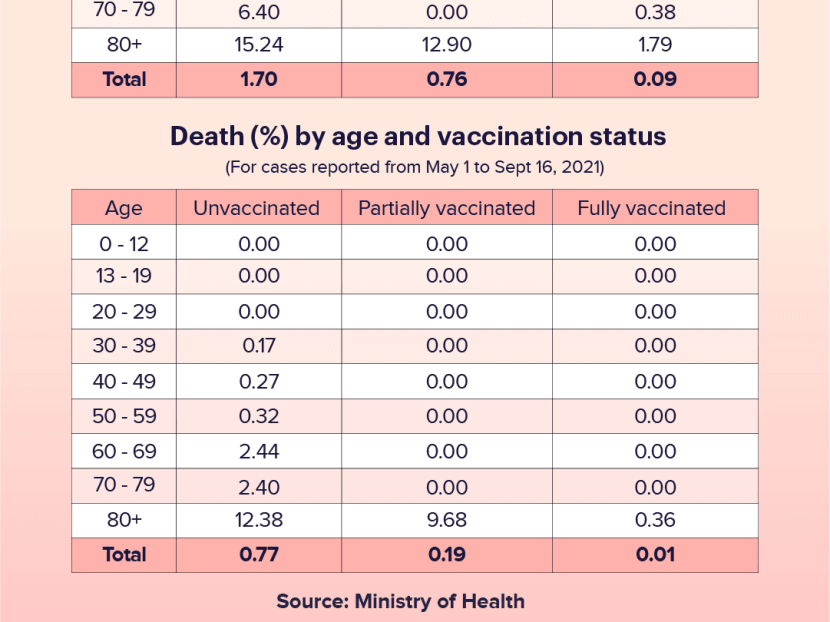Covid-19 cases doubling every 7 to 10 days but ‘encouraging’ that severe cases have not risen in tandem: MOH
SINGAPORE — The number of Covid-19 cases has been doubling every seven to 10 days, but there are "encouraging" signs that admissions to intensive care units (ICUs) and patients on oxygen support have not risen at the same rate, even though there has been a slow uptick, Associate Professor Kenneth Mak said.

Health Minister Ong Ye Kung said that Covid-19 cases are now in its fourth doubling cycle and that Singapore would likely cross 1,000 daily infections soon.
- There are “encouraging” signs that ICU admissions or deaths have not risen alongside the recent surge in Covid-19 cases
- Still, the authorities are keeping a close watch on the numbers, with the next two weeks being crucial
- In the last 28 days, 1.6 per cent of Covid-19 cases needed oxygen support and 0.1 per cent were in critical condition in ICU
SINGAPORE — The number of Covid-19 cases has been doubling every seven to 10 days, but there are "encouraging" signs that admissions to intensive care units (ICUs) and patients on oxygen support have not risen at the same rate, even though there has been a slow uptick, Associate Professor Kenneth Mak said.
The director of medical services at the Ministry of Health (MOH), who was speaking at a press conference on Friday (Sept 17), added, though, that the authorities were watching the numbers closely and it was still “very early” days yet.
“If it continues to follow a very similar pattern, such that we continue to see a higher number of cases occurring in the community but a disconnect emerging, where the total number of cases in our hospitals requiring oxygen therapy or (intensive care) doesn't follow suit at the same rate, we may actually be all right.”
If that is the case, Singapore’s healthcare resources would be “well able to cope” and care would be targeted towards those who are sickened more severely by the coronavirus.
“While the indications are encouraging at this point, the data is still very early,” Assoc Prof Mak said, adding that the authorities will be monitoring the situation over the next two weeks.
MOH said in a statement on Friday that on average, the number of daily Covid-19 cases has more than quadrupled over the past fortnight but serious cases have remained low.
Two weeks ago, the average number of cases was 146 a day. This past week, that figure is 682.
As of Thursday, there were 77 cases requiring oxygen support to breathe, or 1.6 per cent of infections over the last 28 days.
Twelve patients were in critical condition under intensive care, representing 0.1 per cent of infections over the same period.
Health Minister Ong Ye Kung, who was at the same press conference, said that Singapore, however, cannot “sustain many rounds of doubling” in infections.
“The next two weeks are crucial because we will then understand the trajectory (of the coronavirus),” he said.
Mr Ong noted that cases are now in their fourth doubling cycle and that Singapore would likely cross 1,000 daily infections soon.
There were 910 new cases reported on Thursday, 906 of which were locally transmitted.
If the number of cases doubles for a fifth time, there could be 3,200 cases a day, Mr Ong added.
He repeated his call for people to cut back on their social activities and work from home as far as possible, and for unvaccinated persons to get immunised.

Referring to data from MOH, Assoc Prof Mak said that for those aged between 70 and 79, vaccination reduced the risk of death or admission to ICUs to levels similar to those for unvaccinated persons aged 30 to 39.
Among seniors above the age of 80, vaccination lowered the risk of death to levels comparable to those for non-vaccinated persons aged 50 to 59.
Singapore has not seen anyone below 30 needing intensive care or dying from Covid-19, he added.
Age is a factor, because the risk of severe illness climbs progressively with each decade of life and those above 80 are at greatest risk of death from Covid-19 complications.
“The relative risk is between 18 and 70 times higher in those above the age of 80, compared with those in the ages of between 30 and 39 years. And this explains our clear concern for our seniors,” Assoc Prof Mak said.
Based on MOH data, between May 1 and Sept 16, 15.24 per cent of unvaccinated patients above 80 were under intensive care or died, compared with 1.79 per cent among fully vaccinated persons in that age group.
In comparison, 0.84 per cent of unvaccinated patients between 30 and 39 were under intensive care or died in that same period. Fully vaccinated persons in this age group did not develop severe illness.
MOH attributed the small proportion of severe cases largely to Singapore’s vaccination programme, which has covered 82 per cent of residents so far.
It said: “We will press on with our vaccination booster efforts, and will continue to proliferate pervasive testing in the community and at our workplaces.”









